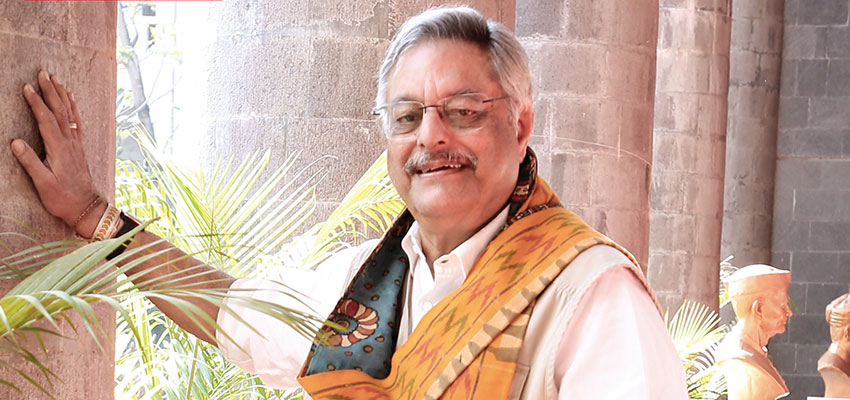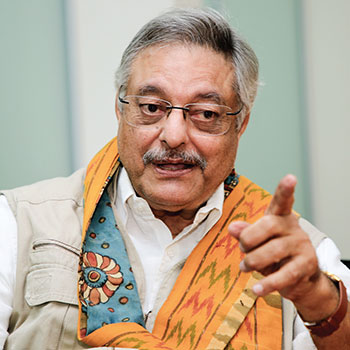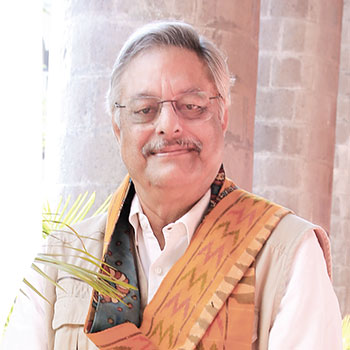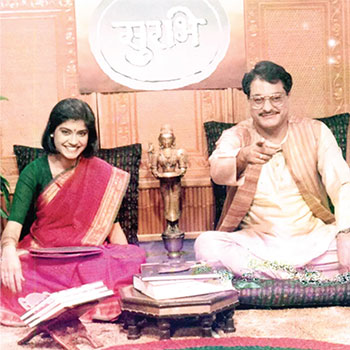The Changing Creative Space

At 75 years young, Siddharth Kak is not just ticking off his longstanding bucket list, but having a blast while at it. So, whether he’s writing the books he’s always wanted or reminiscing over changes in media in the course of a multi-faceted career as producer, documentary maker and presenter, his joie de vivre proves the old adage that life is just a number. Amidst other things, he is also venturing into the education space. Up close and personal with the face of the television presenter with the iconic cultural show Surabhi, that ran over a decade, between 1990 and 2001
As in the case of many others, the Covid-19 pandemic was the proverbial game changer for media man Siddharth Kak. It made him stop and think about what was truly important to him. He put the brakes on work and the speed of his weekly television shows and reset both—boundaries and deadlines—whilst pushing the creative envelope that much more. It is clearly time to share his vast repertoire of knowledge, pictures and learnings through his books and association with educational institutions.
Booked for posterity, at last
I would divide life into two sections: pre and post Covid. When the pandemic hit and life came to a standstill, I asked myself: what am I really doing? And do I want to continue doing this?
I realised that there are certain things I have wanted to do for years now, since I was a young man. But I needed to collect the tools and material for it, which my TV shows never gave me the time to do so. So, here I am presently ticking off my bucket list, at long last.
And, in that sense, this is my second life. I am writing books which I have been wanting to write for a long time.
"I believe in gratitude. From the depth of my heart, I am grateful for the life I have, the world that I live in and the health that I enjoy. From that gratitude springs everything else-including love"
- Siddharth Kak
Tryst with writing

The first one is on my grandfather, and it has an exciting title. I hope it gets made into a film or a television series. It's called Love, Exile, Redemption—a historical story set around the partition of India and the union of Kashmir with India. And yet, why is it a love story? Because, the first English woman to come into Kashmir in the 1930s was through the marriage of my grandfather—imagine that. And how did they even get to know each other? How did their romance flourish across continents in the story?
Actually, I was not born until 1947—the year of partition. But, my grandfather left his memoirs, and they became a rich source of information for me, a veritable treasure trove. My grandmother wrote letters every week. She wrote so beautifully. These letters have become a priceless source of knowledge not only about their lives, which we were not acquainted with, but also about Kashmir of that time. And luckily my aunt and her daughter, had the letters.
So, we collaborated over two years of Covid, and then a year or so more after that to write this book which I hope you will find interesting.
My second book, titled A Fire over Everest is on Mount Everest, which has very much been part of this adventure, I call life. So yes, I have climbed the Everest—not actually gone to the summit for I am not trained for it, but I have had a definitive tryst with it. I was the head of the film team of 1984’s Mount Everest Expedition in which India's first woman climbed to the summit of Mount Everest the iconic Bachendri Pal, to be precise.
Bachendri brought five stones down from the summit of Everest. When she came down, she became world famous. I won the National Award for the best film of 1985. We, as a team, climbed up to that crossing that included the most dangerous parts of Mount Everest. It was the adventure of a lifetime. All of this has found its way into the book.
Once again, this is a very human story. Add to the uniqueness of being the first expedition which had women members. Part of our strategy of filming was to go to each of the homes of these seven women. We asked them, "Where do you think you'll go from here?" Each one had a tale to tell. The rest is history.
It’s the 40th anniversary of the Everest Expedition in May this year, so I am hoping the book will be released on that occasion.
Of education and research
I'm now very happy to be associated with MIT World Peace University as a mentor and an advisor for the School of Liberal Arts. That includes design, journalism, filmmaking and so forth. We have some ambitious plans to bring new elements into the curriculum. One of them would be a project called the Indian Knowledge Systems (IKS). I am fortunate, by God's grace, to have one of the largest audiovisuals, professionally filmed libraries of India's culture and ancient times as well—about 10,000 hours of footage to be precise. So slowly we hope that we will take up different projects in which the archive will also become available for education for youngsters.
The renowned Bhandarkar Oriental Research Institute (BORI) is associated with MIT in developing the IKS for the MIT curriculum. As you know, BORI has been engaging with the public with several interesting online programmes.
There are pictures and research, but how about archiving them on film? And one of the things which I hope to be able to do with MIT Liberal Arts, particularly in the film and journalism department, is to create an archive of the knowledge of great Indians They need not be in great positions. They could be humble potters also. There are many pertinent questions to be asked — How have you learned, what you have learned? This indigenous knowledge of people who have achieved something will be preserved uncut. These interviews are not edited.
They will form a repository of what we call Bharatiyata, the spirit of Indianness that runs like a common thread all through. So, all in all, it’s a very interesting journey of discovering knowledge. I would not be complacent in anyway; I am always learning.
"Believe in whatever you do—whether you are journalists, writers, or filmmakers. Everything else will flow from that belief. You will be dedicated and passionate unto excellence"
Surabhi the cultural show he presented with actor Renuka Shahane

Amidst all these things, two questions always stand out: how and why? And that I think was the questioning that allowed Surabhi to discover in those pre-Google days. Starting from 1990 to 2001, it became the longest running television show. For us to know anything, we had to either read it up or we had to talk to somebody or even more important sometimes, go there and find out.
And, that’s what made our show so interesting. We explored different facets of the topic. For that, our research had to be deep.
There are innumerable examples of us travelling for research and trying to talk over a rather reluctant Indian telephone system. We took a break for a year in the backdrop of the Mumbai riots.
Growing up and studying in English mainly, like many other kids, I was distant from my roots. This programme became a via medium. I wrote most of the scripts. I created a colour coding system to organise the material I had. Red was for material that had already been telecast; blue was being planned to be filmed and green that was yet to be telecast.
How he would have done Surabhi differently today:
If I were to do the Surabhi today, first, the research—I could simply do it from my room. Google is the equivalent of a hundred assistants. I just need a couple of people with me who are knowledgeable and know how to look for information. And then the second thing is that there is a much more developed culture of filmmaking across the country.
On his fruitful partnership with Renuka Shahane
Our wonderful bonding had a great deal to do with two things. One is Renuka herself and her vibrant temperament, the selection of people who believed in the show, and I was fortunate to get a core team.
Quite frankly, Renuka was smarter than me. Although, I wrote the script, her memory was much better than mine.
She was a young woman flourishing in her own freedom. I think people liked that. I was more like a father figure to her, given the age difference. When my late wife Geeta and I selected Renuka for the auditions, we were struck by the intelligence in her eyes, which shone through as she spoke.
"I am fortunate, by God's grace, to have one of the largest audiovisuals, professionally filmed libraries of India's culture and ancient times as well—about 10,000 hours of footage to be precise"
THE LINGERING ‘FRAGRANCE’ OF SURABHI

The iconic Surabhi was an Indian cultural magazine show hosted by Renuka Shahane and Siddharth Kak, which ran from 1990 to 2001 with a year’s break. It was initially telecast on Doordarshan before moving to Star Plus in the Sunday morning slot. Surabhi was produced by Kak’s Mumbai-based production house Cinema Vision India. Its theme was Indian culture. The show is India’s longest-running cultural series and features in the Limca Book of Records for receiving the largest measured response ever in the history of Indian TV. The title music for the show was composed by Indian composer and classical violinist, L. Subramanian. Dairy giant Amul sponsored it for a long time. During the nineties, Surabhi had become a benchmark show and is known as one of the best TV shows ever made that reflected the length and breadth of Indian culture.
His observations on today’s media channels, OTT, and news
When OTT first began, it was really a happy hunting ground for new talent, which is beginning to slowly fade out.
The second—it is getting increasingly important to have a successful show, successful series, and you need to keep adding to your repertoire every week, every other day. That’s how we have so many seasons of the show.
Now, again, just as in feature films, you must be very picky and choosy about what you do as far as feature films or even TV series are concerned.
Speaking of news, one must see it in the context of the world. What do you think is happening in the United States of America? They began this whole thing of aligned news. If you are aligned, you get the money. The only difference is that in America it is a lot of private money and private players doing it.
I don't watch television now because I feel it is not the same as it used to be when I started out—also, let me tell you of long winded things or government propaganda. In those days, we could run a show, but nobody used to interfere with what we did.
Speaking of Surabhi, we were fortunate to have Dr. Verghese Kurien and Amul backing it for 10 years—I have great love and respect for the entire group, and it is reciprocated.
Advice to young media men and women in media…
Believe in whatever you do—whether you are journalists, writers, or filmmakers. Everything else will flow from that belief. You will be dedicated and passionate unto excellence.
On his philosophy of life
The philosophy I advocate for others cannot be different from what I advocate for myself. So, yes, I believe in gratitude. From the depth of my heart, I am grateful for the life I have, the world that I live in and the health that I enjoy.
From that gratitude springs everything else—including love. I love the things I do; I love the people with who I am.